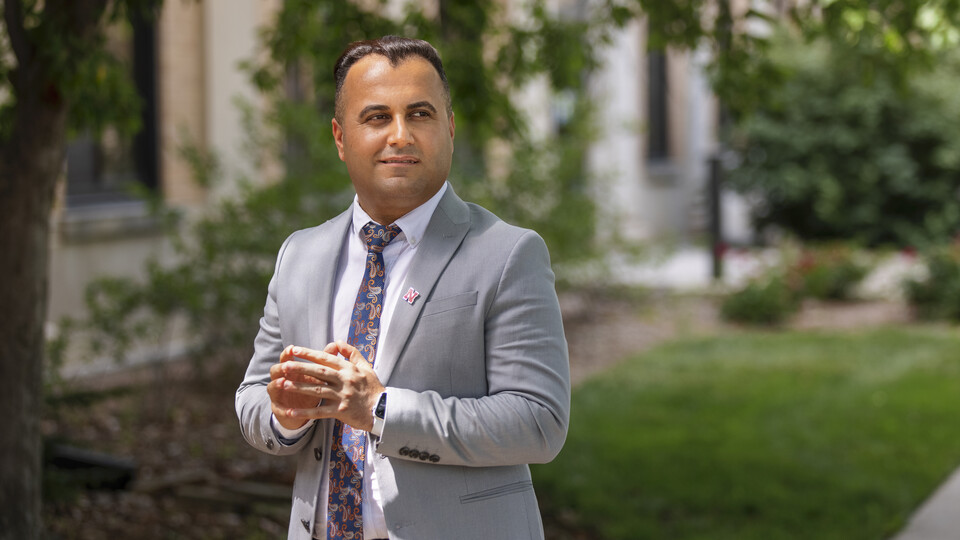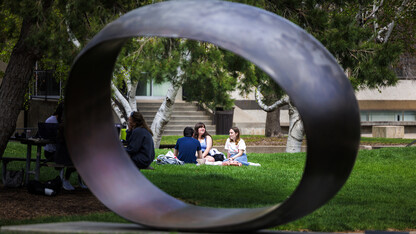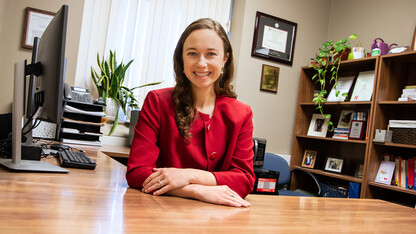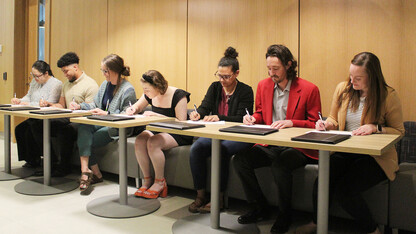· 4 min read
Rashoka helps turn pandemic tide for Yezidi community

Falah Rashoka heard a knock at his door.
Peering through the peephole, Rashoka recognized the man. He’d met him in the Yezidi refugee community — of which Rashoka is a member — but also knew the man had been sent home from work with a fever and was awaiting results of a coronavirus test.
It was May 2020, in the early months of the pandemic, with cases and deaths multiplying each day in Nebraska. Rashoka, then a master’s student at the University of Nebraska–Lincoln, knew many in the Yezidi community had contracted the virus as essential workers in retail, service or meatpacking jobs. There was a good chance the man standing at his door was ill with COVID-19.
“It was a very scary time,” he said. “There were a lot of cases among the immigrant and refugee communities. I think 85 percent of the (Yezidi) community got COVID-19.”
Rashoka was being very careful, following all the precautions in order to protect his own family, especially his 67-year-old mother, who had underlying health conditions. He hesitated to open the door, but the man needed help.
“He was holding his phone up,” Rashoka said. “I asked him to step back five feet and tell me what was going on.”
In Kurmanji, a Kurdish dialect, the man said he’d gotten a phone call with his results but couldn’t understand what the caller was telling him. Rashoka took the phone and listened.
“His test was negative,” Rashoka said. “When I hung up the phone and told him, he started dancing. He was so happy. I was happy, and relieved.”
The experience repeated itself — though not often with a joyful outcome — throughout the worst months of the pandemic, when Rashoka was a volunteer interpreter for Nebraska’s 23 health departments. He knew from his master’s thesis research that the biggest barrier to health care for refugees and immigrants was language, and he could fill the gaps in three of them.
“With very specific dialects, a lot gets lost in translation, and the health department was facing a problem with interpretation — nobody was available,” Rashoka said. “Miscommunication leads to misdiagnoses.”
Rashoka kept his research going, too, beginning a doctoral program in community nutrition and health promotion at Nebraska while simultaneously pursuing a second master’s in public health at the University of Nebraska Medical Center. Throughout the pandemic, Rashoka met with his research focus groups over Zoom and continued documenting the effects of COVID-19 on the refugee and immigrant communities. He’s published two papers and provided reports and information to various state and local agencies.
The health care barriers for immigrants he’d previously identified — social isolation, cultural differences, a lack of transportation or health insurance or knowledge of the United States’ health care system — were exacerbated by the pandemic.
“So many people lost their jobs, their insurance, their social contacts,” he said. “And interpretation was harder over the phone. Chronic disease has been worse because there are some who are still not able to get the right health care.”
To help alleviate the barriers, Rashoka and adviser Megan Kelley, assistant professor of nutrition and health sciences, developed a booklet in Arabic and English to be distributed to Yezidi and other refugee communities. The resource, “Using the Health Care System in Lincoln, Nebraska: A Resource for the Yezidi Community,” is a simplified guide to navigating health care — from finding the right provider to using the federal health insurance marketplace. He’s working to get it distributed widely now.
As the pandemic began to recede somewhat, Rashoka turned his attention to helping get minority groups vaccinated. He’s working with a team from UNMC and Nebraska to understand why some immigrants haven’t been vaccinated yet.
The language barrier is again playing a large role, but so is misinformation, which Rashoka said may be harder to overcome. The team is reporting its findings to the Nebraska Department of Health and Human Services in July, with the hope of guiding programs that will aim to get more people vaccinated.
“This study is imperative and the first of its kind to report reasons behind COVID-19 vaccine hesitancy among Nebraskans, especially with new COVID-19 strains that could (unravel) all this effort,” Rashoka said. “The study recommends reasonable solutions to these barriers, such as providing mobile clinics in hard-to-reach communities, offering training to more healthcare workers to give vaccines, having interpreters with cultural knowledge and a robust medical background in local health departments.
“In addition to campaigns to raise awareness on COVID-19 vaccine safety, we recommend administrating vaccines at community cultural centers and other sites that minority groups visit, and reaching out to community leaders and politicians to share with their supporters that vaccines are safe and needed.”







